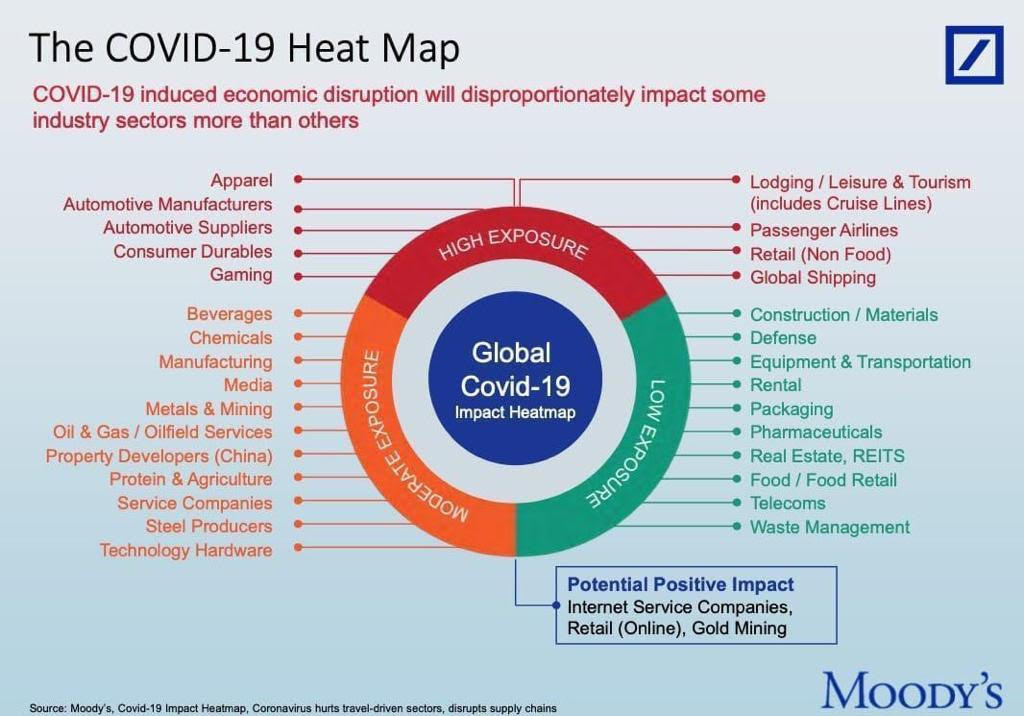Effect of coronavirus on Businesses
The novel coronavirus has disrupted nearly all operations across the globe. Industries in general and business, in particular, are the victim of this virus. This virus which affects the respiratory system of the victim has to date killed many innocents globally, with highest deaths recorded in Italy i.e. around 10k.
Traveling has been put to halt and as a matter of fact all human to human interaction has been minimized as this virus is contagious. Social distancing is the only approach effective so far to mitigate the far-reaching effects of coronavirus.
Impact on businesses
As per Moody’s assessment industries that will bear the biggest brunt of this pandemic are; Textile, automotive, consumer durables, gaming, lodging/leisure and tourism, airlines, retail (non-food) and shipping. Those getting moderately affected include, beverages, chemicals, manufacturing, media, metal and mining, oil and gas, property developers, agriculture, services, steel and technology hardware. Industries that will bear the lowest impact are construction, defenses, equipment and transportation, rental, packaging, pharmaceutical, food, telecom and waste management.
Potential positive impact will be upon, internet services companies, retail online and gold mining.
Why conventional research is not an option now?
Conventional research involves field surveys and human interaction is involved but given the circumstance this cannot take place now but instead online means can be adopted effectively to conduct research. In recent stats it is being revealed that internet usage has increase significantly and people are spending more time online.
Digital research has seen a shift from conventional paper and pencil research in recent times and with ever increasing use of online platforms companies are using digital means to assess needs and preferences of their customers. It has been observed that FMCGs and Telecom are affected with less by coronavirus and this is good time or such industries to analyze the shift in demand of their customers and be prepared to meet the with maximum productivity.
How to conduct Digital Research
Online Market Research is a research method in which the data collection process is carried out over the Internet.
Online Market Research can be either Qualitative or Quantitative. Qualitative Online Tools include Video Ethnography and Market Research Online Communities (MROCs). Quantitative Online Methods include mobile and app surveys.
This research can evaluate the performance of a product or service and may allow companies to glean insight into consumer purchasing behavior. With the rising use of the Internet, digital research has become a popular tool among market research firms.
Digital research can provide additional information about a buyer, such as her prior purchasing history. Digital research projects can be carried out by a company itself or by a hired research firm. There are several ways that may be effective for carrying out digital research. Quantitative research can be carried out via online questionnaires and web-based experiments. Qualitative research can be carried out via online in-depth interviews, online focus groups and participant observation, in which a researcher acts as a part of a community to observe behaviors.
Online questionnaires and online polls are some of the most popular digital research tools. Online questionnaires may need to be carefully designed in terms of format and length. Some of the key digital research models Ace Research offers include;
1. Brand Heath tracking
Brand Analysis: Brand research has similar profiling features (“Who uses this brand?”) and also aims at identifying the reasons for brand loyalty or fickleness.
Scanner Research: Scanner research uses checkout counter scans of transactions to develop patterns for all manner of end uses, including stocking, of course. From a marketing point of view, scans can also help users track the success of coupons and to establish linkages between products.
2. Consumer research
Audience Research: Audience research is aimed at discovering who is listening, watching, or reading radio, TV, and print media respectively. Such studies in part profile the audience and in part determine the popularity of the medium or portions of it.
Product Research: Product tests, of course, directly relate to use of the product. Good examples taste tests used to pick the most popular flavors-; and consumer tests of vehicle or device prototypes to uncover problematical features or designs.
Psychological Profiling: Psychological profiling aims at construction profiles of customers by temperament, lifestyle, income, and other factors and tying such types to consumption patterns and media patronage.
Database Research: Also known as database “mining,” this form of research attempts to exploit all kinds of data on hand on customers-; which frequently have other revealing aspects. Purchase records, for example, can reveal the buying habits of different income groups-;the income classification of accounts taking place by census tract matching. Data on average income by census tract can be obtained from the Bureau of the Census.
3. Pre/post campaign evaluation
Post-sale or Consumer Satisfaction Research: Post-consumer surveys are familiar to many consumers from telephone calls that follow having a car serviced or calling help-lines for computer- or Internet-related problems. In part such surveys are intended to determine if the customer was satisfied. In part this additional attention is intended also to build good will and word-of-mouth advertising for the service provider.
4. Monitoring and evaluation
M&E can be conducted using a wide array of tools, methods and approaches. These include, for example: performance monitoring indicators; the logical framework; theory-based evaluation; formal surveys such as service delivery surveys, citizen report cards, living standards measurement surveys (LSMS) and core welfare indicators questionnaires (CWIQ); rapid appraisal methods such as key informant interviews, focus group discussions and facilitated brainstorming by staff and officials; participatory methods such as participatory M&E; public expenditure tracking surveys; rigorous impact evaluation; and cost-benefit and cost-effectiveness analysis. With the aid of digital research all these facets of M&E can be conducted online.
5. Online Discussions (Focus Group and In-depth)
Another common practice for online surveys is the use of online panels. An online panel is a group of selected individuals that have agreed to participate in digital research projects for a particular company at specific intervals over a period of time. These participants are selected through a screening process according to their demographics, lifestyles and habits, and are usually rewarded for their efforts by the research company regularly. Online panels may allow companies to glean insight into creating long-term relationships with their customers. These panels may also allow customers to give direct feedback about products and services without the potential reluctance that may occur in face-to-face interactions. Online panels may also mitigate bias caused by peer pressure to agree on a certain viewpoint, a phenomena that may occur in face-to-face panels.
Benefits of Digital Research
Amid the outbreak of this virus, businesses are widely affected and we all hope for better results with least damage in coming days to people and businesses alike. Nonetheless, once things get settle down the businesses have already borne the wrath of this virus and revenues are dwindling. So in these circumstances it is crucial for companies to closely monitor their clients and consumers so after this virus settles down, a strategy based on factual research can be devised immediately to recover the losses effectively.
To sum up, we have following advantages of conducting digital research.
- Cost advantages
- Speed advantages
- Data collection in real-time
- Advanced analytics
- Efficient global and multi-country survey management
Conducting digital research can be a complex procedure and may require considerable expertise on the part of researchers in obtaining accurate data. It may be challenging to recruit participants in digital research for several reasons. Recipients may be reluctant to participate in digital research because they may be afraid that the privacy and confidentiality of their personal information may be violated. Since the identity of the researcher cannot be verified completely, people may find it difficult to trust such research methods. Researchers often present participants with some monetary or non-monetary rewards for their participation

